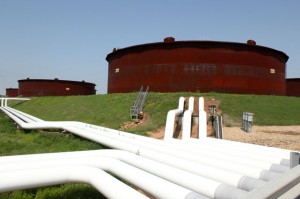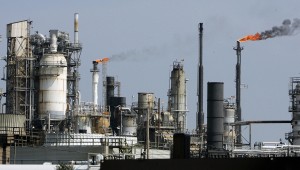As Oil Glut Moves, Debate Ignites Over Exporting U.S. Crude
The United States has never exported much crude oil. We use so much of the stuff that we’ve always needed to import it from other countries. But even if we wanted to ship it away, there are laws that ban most all overseas crude exports. Now, as domestic drilling continues to surge, some are calling for the repeal of those laws.
To understand why, it helps to remember the ‘Cushing Glut.’
If you pay attention to the oil business, you might remember the glut. It’s a bottleneck of crude oil – much of it unleashed through fracking in North Dakota’s Bakken Shale — shipped to Cushing, Oklahoma in pipelines, then trapped there.
Hannah Breul is an industry economist with the U.S. Energy Information Administration who studied that bottleneck. She says the mechanics of the glut are about as simple as household plumbing.
“If you think about it as a bathtub, you have water coming in from the faucet, but then also coming out of the drain. The relative level of those flows will impact what the overall inventory is at any one time,” says Breul.
For the last few years, the drain in Cushing was too small for the stuff pouring in. So the bathtub filled to the brim.
Then, this year, the pipeline company TransCanada opened up the southern leg of its Keystone XL pipeline. That, and the reversal of an existing pipeline known as the Seaway, made the drain bigger. The glut moved south.
“Now you’ve essentially established the valve to move some of that overflowing bathtub to the Texas and Louisiana Gulf Coast,” says Tom Kloza, chief oil analyst with Gasbuddy.com.
But that area was already awash in domestically-produced crude.

Photo by Tom Pennington/Getty Images
U.S. President Barack Obama spoke in Cushing about fast tracking the Keystone pipeline from Cushing to the Gulf.
“There are concerns that there may be too much, that there may be congestion, and that we may see much cheaper prices there [along the Gulf]. Because of so much crude oil descending on the refining centers of the country,” says Kloza.
That back-up of light sweet crude (the type being produced in much of the U.S.) is providing some oil companies with an argument to push for exports.
Since the oil crisis of the 1970s, the U.S. has had a de facto ban on overseas crude exports. Now, industry groups like the American Petroleum Institute say those laws have got to change. They could, of course, profit greatly from opening up foreign markets to U.S. crude, but they’re selling the idea by highlighting potential benefits to the U.S. economy.
“By lifting the ban, we would incentivize additional domestic production. That means more jobs. That means stronger economic activity. That means government revenue. It also means that we would be reducing our trade deficit,” says Kyle Isakower, the API’s vice president of regulatory and economic policy.
Critics say it could make the U.S. less energy-secure, and mean higher prices at the pump.
“Those producers would like to get the higher price overseas rather than the lower price here in the U.S. And to us, it’s very logical that if you get a higher price for oil, that means a higher price for gasoline and diesel at the pump,” says Bill Day, a spokesperson for the oil refiner Valero Energy.
Take one look at Day’s title and you see that ramping up exports don’t have the support of the entire oil industry. Companies that drill for oil (producers, in industry language) generally favor exports. Companies that refine the oil do not.
That’s, in part, because refined crude products can already be exported. U.S. refiners are also currently swimming in an abundant supply of low-cost domestically-produced crude. They buy it from the drillers – refine it – and sell it to consumers at a tidy profit. Why would they want to mess with a good thing?
Proponents of exports answer that free markets will benefit everybody. Though, even if you support free markets, Gasbuddy.com’s Tom Kloza says there’s a problem with the argument.
“You cant really call something a free market, like oil, when you have a cartel, OPEC (Organization of the Petroleum Exporting Countries), that sets prices,” says Kloza.
Add to the debate a pressing concern over global climate change, and further worries about what exports would mean for U.S. energy security, and we can expect to hear more about exports in the coming years.
Politicians are already staking out territory. Here in Texas, Congressman Michael McCaul (R-TX 10th) recently filed a bill to repeal the crude oil export ban. The U.S. Senate Energy and Natural Resources Committee also looking into the issue.
“It’s going to be a controversial story,” says Kloza.




